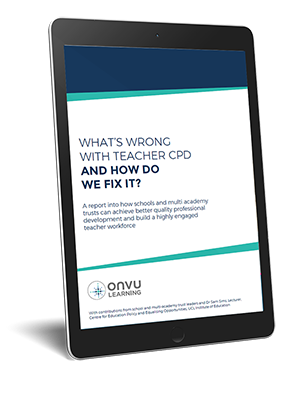- School Standards
- 4 Minute Read



The Institute for Public Policy Research's (IPPR) report, "Improvement Through Empowerment," presents a compelling argument for a fundamental shift in the approach to enhancing school and teacher performance. This blog, the fourth in a series dissecting the report, addresses headteachers, school leaders, and Multi Academy Trust leaders, drawing attention to the challenges within the current educational framework. We explore the strategic recommendations outlined in the report, advocating for a more empowered, data-informed, and supportive educational environment while drawing relevant insights garnered in previous blogs of this series.
The IPPR report illuminates several critical issues faced by the educational sector under the current regime. At the core, the practice of trust-level oversight has revealed significant gaps, including the lack of comprehensive and objective data to inform decisions, inconsistencies in support across different schools, and a one-size-fits-all approach that fails to cater to the unique needs of individual educational settings.
The report critiques the current oversight practices for their reliance on inadequate data and the resultant inconsistent support provided to schools. This scenario leads to a reactive, rather than proactive, approach to addressing school needs, hindering the development of tailored strategies that could significantly improve educational outcomes.
"It is right that we expect high standards from our school system. Educational equity remains a distant goal and a changing world means that achievement must constantly be ratcheted up. Yet at present, high expectations are not matched by a supportive and empowering, evidence-rich infrastructure"
This echoes concerns raised in our series’ first blog, Transforming Lesson Observations, where the present emphasis on traditional lesson observations. These make broad, snapshot judgements, often with subjective metrics that fail to capture the intricate and ongoing dynamics of classroom engagement, underscoring the need for a more detailed, objective and ongoing approach to data collection and analysis.
The IPPR challenges the prevailing one-size-fits-all strategy, highlighting its ineffectiveness in fostering excellence in education. This approach is critiqued in the Boosting School Performance with Tailored Improvements blog as ineffectual in addressing the diverse challenges faced by schools. The report underscores the necessity for a more nuanced approach that recognises and accommodates the diversity of challenges and opportunities within different educational contexts.
In addressing these challenges, the IPPR report advocates for an empowerment-centric approach, emphasising the importance of equipping schools and teachers with the tools and information necessary to drive their own improvement. The report's advocacy for customised strategies reaffirms the importance of acknowledging each school's unique context, noting:
"In a world where empowerment drives improvement, there would be a much clearer distinction between the role of the inspectorate and the role of the regulator".
The report calls for a shift towards a system that values and utilises comprehensive, objective data to inform decisions at every level of the educational hierarchy. By doing so, it envisions an educational landscape where schools are not merely recipients of top-down directives but active agents in their journey towards excellence.
Moreover, the report emphasises the need for developing and implementing strategies that are specifically designed to meet the unique needs of each school and classroom therein. This personalised approach ensures that interventions are relevant, effective, and capable of fostering sustainable improvement.
This vision is supported by the insight, "Skilled, empowered teachers are our best hope for improving schools", aligning with our Personalising CPD in Schools blog where the crucial role of skilled, empowered teachers in driving school improvement was emphasised.
The IPPR report does not only critique the current state of affairs but also offers a roadmap for the way forward, outlining specific recommendations for both government action and school-level initiatives.
The government is urged to create and sustain frameworks that empower schools to access and leverage data, facilitating informed decision-making and the development of tailored strategies. This includes providing stable, long-term funding for professional development and ensuring that regulatory mechanisms are conducive to school-led improvement efforts.
School leaders are encouraged to embrace the autonomy and flexibility afforded by the new paradigm, actively seeking innovative solutions to enhance educational outcomes.
"It is clear the quality of teaching is not fixed: teachers can improve with effective professional development" (Collin and Smith 2021).
This call to action complements the focus of Transforming Lesson Observations and "Personalising CPD in Schools, underscoring the role of leadership in cultivating a culture of continuous, data-informed improvement.
We identify an alignment of 360-degree video lesson capture technology, specifically ONVU Learning's innovative solution, with the report’s recommendations. This technology exemplifies the shift towards data-informed, teacher-empowered approaches to school improvement.
The use of 360-degree video lesson capture technology embodies the report's call for a new standard in school and trust-level oversight. By providing detailed, objective and continual insights into teaching practices and their impact on every student, this technology facilitates a deeper understanding of educational dynamics, enabling tailored support and fostering a culture of continuous improvement.
Crucially, this technology places control in the hands of teachers, aligning with the report's emphasis on empowerment. Teachers can reflect on their own practices, share best practices with peers, and engage in professional development activities informed by concrete evidence of their teaching. This approach enhances teacher autonomy and contributes to a more supportive, collaborative educational environment:
The ability to record and review one’s own teaching practices offers a powerful tool for self-reflection. A lot of clarity can be gained from 360-degree video hindsight. Teachers can critically assess their performance, identify areas for improvement, and witness their progress week by week. This reflective practice is a cornerstone of professional development, allowing educators to evolve continuously and effectively.
Sharing best practices within a school or across a MAT fosters a culture of collaboration and mutual learning. Teachers can learn from one another, gaining insights and inspiration from the successes of their peers. This enhances the quality of teaching within the institution while building a supportive community of educators committed to ongoing improvement.
Integrating a comprehensive video library of best practice at both the school and Multi-Academy Trust levels represents a significant advancement in educational technology. The video library serves as a concrete evidence base for professional development activities. Teachers can pinpoint specific teaching strategies or methods that have proven effective, facilitating targeted and practical training sessions. This evidence-based approach ensures that professional development is directly relevant to the needs and realities of teachers’ day-to-day experiences and the student cohorts they are supporting.
The IPPR report, "Improvement Through Empowerment," presents a compelling vision for the future of education, one that is data-informed (not dependent), teacher-empowered, and tailored to meet the unique needs of each school. By embracing the recommendations outlined in the report and leveraging innovative technologies like ONVU Learning's 360-degree video lesson capture technology, schools and government alike can work towards a more equitable, effective, and empowered educational landscape.
Did you miss our previous Insights on the IPPR "Improvement through Empowerment" Report? If so, check out:
Part 1: Transforming Lesson Observations
Part 2: Personalising CPD (Continuing Professional Development) in Schools
Part 3: Boosting School Performance with Tailored Support
You can download the full Institute for Public Policy Research (IPPR),"Improvement through Empowerment" report at: https://www.ippr.org/files/2023-11/improvement-through-empowerment-nov23.pdf

An insightful and informative report exploring how schools and multi academy trusts can achieve quality professional development and build a highly engaged teacher workforce.
With contributions from influential education leaders, it’s a read you won't want to miss.
KEEP IN TOUCH WITH ONVU LEARNING AND BE THE FIRST TO RECEIVE THE LATEST NEWS AND INSIGHTS ON EDTECH, LESSON OBSERVATION, TEACHER TRAINING AND DEVELOPMENT.